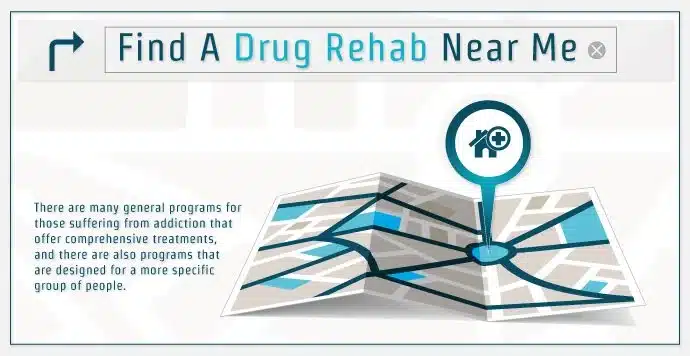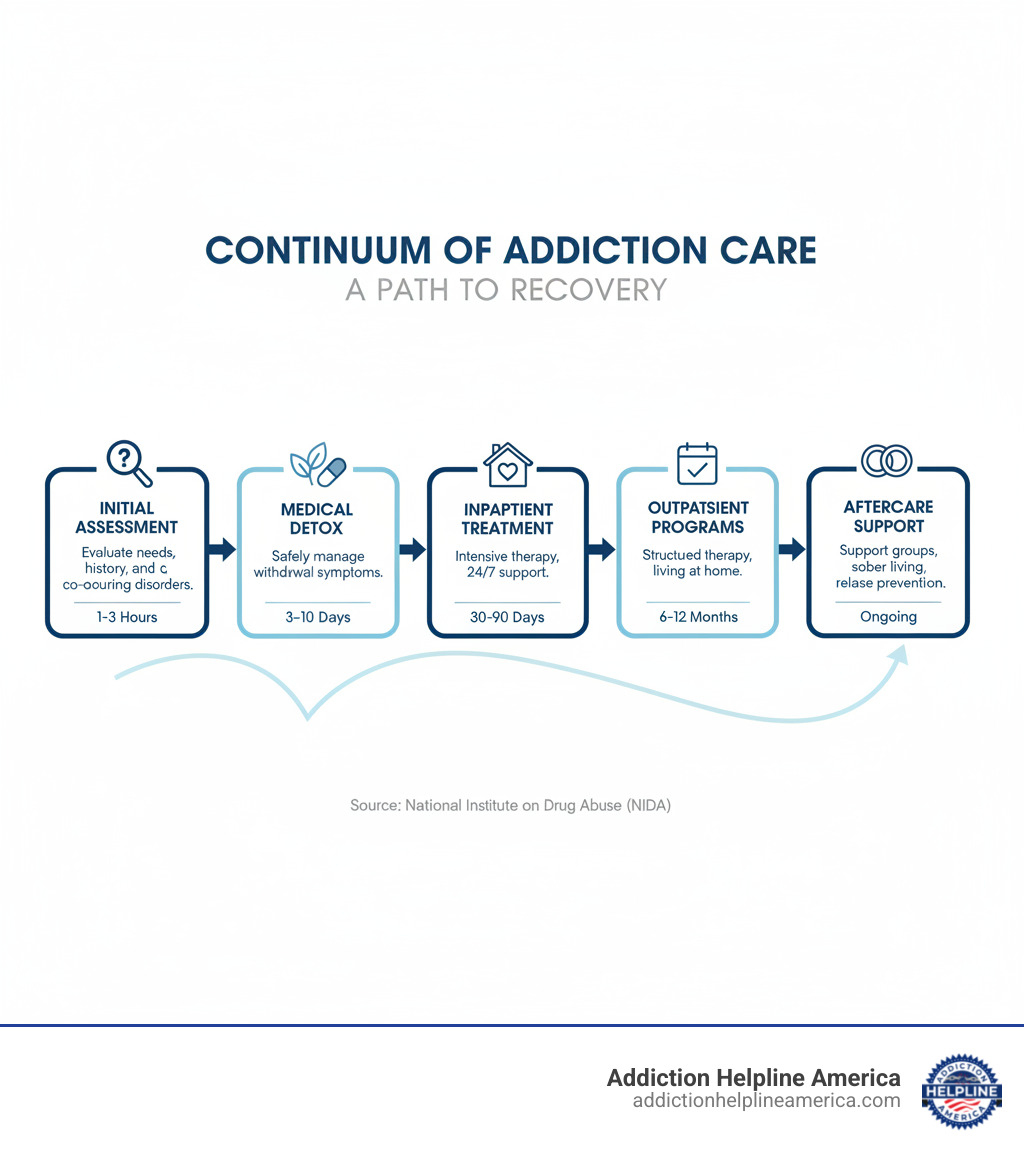
The First Step to Recovery: Understanding Addiction Treatment
Find a rehab center near me by using these immediate resources:
- 24/7 National Helplines: Call 1-800-662-HELP (4357) for SAMHSA’s free, confidential treatment referral service.
- Online Search Tools: Visit FindTreatment.gov for a searchable, anonymous database of facilities nationwide.
- State Agency Directories: Contact your state’s substance use agency for local, state-funded options.
- Private Directories: Use verified resources to compare facilities by location, insurance, and specialized programs.
- Emergency Support: Call or text 988 for immediate crisis support.
The treatment gap is real. In 2022, of the 54.6 million people aged 12 or older who needed substance use treatment, only about 13.1 million received any. Overcoming addiction alone can be overwhelming. Professional rehab provides a safe environment with medical detox, evidence-based therapy, and relapse prevention strategies that significantly improve recovery outcomes.
Your recovery journey is unique. The right facility depends on your personal needs, goals, and circumstances. At Addiction Helpline America, we’ve helped thousands of individuals and families find a rehab center near them through our 24/7 helpline and comprehensive treatment directory. Our experienced team connects you with verified facilities that match your specific needs, insurance coverage, and recovery goals.
This guide walks you through everything you need to know to make an informed decision.
The Purpose of Drug and Alcohol Rehab
When you find a rehab center near me, you’re entering a place designed to help you build a new foundation for your life. Think of it as a bridge from a life of addiction to one of health, control, and hope. Quality treatment programs provide the tools to cross that bridge safely.
Key components of rehab include:
- Safe Detoxification: For substances like alcohol or benzodiazepines, withdrawal can be dangerous. Medical detox provides 24/7 supervision and care to manage symptoms and ensure your safety.
- Therapeutic Intervention: Through individual and group therapy, you’ll explore the root causes of your addiction, whether it’s trauma, stress, or other underlying issues. This understanding is key to moving forward.
- Life Skills Training: Effective rehab teaches practical skills for managing stress, communicating effectively, and building healthy routines without relying on substances.
- Relapse Prevention: You’ll learn to identify your personal triggers and develop strategies to cope with cravings, creating a solid plan for maintaining sobriety after treatment.
- Co-occurring Disorders Treatment: Since about half of people with substance use disorders also have a mental health condition like depression or anxiety, the best programs offer integrated treatment to address both issues simultaneously.
Taking this step takes courage, but you don’t have to do it alone. Professional help is the safest and most effective path to recovery. Our Understanding Alcohol Addiction Guide offers more insight into what to expect. At Addiction Helpline America, we know recovery is possible, and we’re here to help you believe it too.
Location Matters: Choosing the Right Rehab Center for You
When you’re ready to find a rehab center near me, one of the most important decisions you’ll face is where that center should be. The location can shape your entire recovery experience, affecting your support system, potential triggers, and transition back to daily life. Let’s look at the options so you can make the best decision for your journey.
Pros and Cons of a Rehab Center Near Me
Staying close to home can be incredibly comforting. The main benefits include:
- Local Support System: Your family can visit more easily and participate in family therapy, providing crucial motivation.
- Easier Aftercare Transition: When you complete your program, you’re already in your community, making it easier to connect with local support groups and continue outpatient therapy.
- Lower Travel Costs: Choosing a local facility eliminates expenses for flights, long drives, or hotels for you and your family.
However, staying local also means staying close to potential triggers and negative influences that may have contributed to your substance use. For some, the lack of privacy in a smaller community can also add unnecessary stress. The key question is whether your home environment is a source of strength or struggle. Our Recovery for Families page offers guidance on involving loved ones in a supportive way.
When to Consider a Rehab Center Outside Your Immediate Area
Sometimes, the best thing for recovery is a fresh start in a new environment. Traveling for treatment physically removes you from daily stressors and temptations, allowing you to focus completely on recovery.
Other benefits include:
- Increased Privacy: Going to a different city or state offers anonymity, allowing you to heal without worrying about local gossip.
- Access to Specialized Care: The best facility for your specific needs—like dual diagnosis or trauma-informed care—may not be in your backyard. Traveling expands your options.
Of course, traveling has challenges. The distance from support can feel isolating, and there are higher costs to consider. A successful transition home also requires careful aftercare planning. The choice comes down to what you need most right now. Our How to Prepare for Rehab guide can help you get ready for the journey ahead.
How to Find a Rehab Center Near Me That Fits Your Needs
Finding the right rehab is a personal journey. It can feel overwhelming, but breaking it down into steps makes it manageable. Here’s how to find a facility that truly understands your needs.
Step 1: Determine the Right Level of Care
Addiction treatment isn’t one-size-fits-all. The right level of care depends on the severity of your addiction, your health, and your home environment.
- Medical Detox: The first step for physical dependence on substances like alcohol or opioids. It provides 24/7 medical supervision to manage withdrawal symptoms safely. Learn more in our Rapid Detox Alcohol Complete Guide.
- Inpatient/Residential Treatment: You live at the facility for 30-90 days, immersed in a structured, trigger-free environment. This is ideal for those needing intensive support. See what a program looks like in our Overcoming Addiction in 30 Days guide.
- Partial Hospitalization (PHP) & Intensive Outpatient (IOP): These programs offer structured therapy for several hours a day or week while allowing you to live at home. They are great for those with strong support systems or as a step-down from inpatient care. Explore all Treatment and Recovery Options here.
Step 2: Evaluate Therapies and Specialized Programs
Look for facilities that use evidence-based therapies like Cognitive Behavioral Therapy (CBT) and Dialectical Behavior Therapy (DBT). If you’re also struggling with depression or anxiety, ensure the center offers dual diagnosis treatment, which addresses both addiction and mental health simultaneously. Our guide to Treatment for Depression and Anxiety explains why this is crucial.
Many centers also have specialized programs for groups like veterans, first responders, or couples. Finding a program that understands your unique circumstances can significantly improve your chances of success.
Step 3: Use Verified Resources to Locate Facilities
Don’t just rely on a quick search. Use trusted resources to find quality care.
- Addiction Helpline America: Our free, confidential helpline and directory connect you with vetted treatment centers across the country. We listen to your needs and help you find a program that matches your insurance and recovery goals.
- SAMHSA: The Substance Abuse and Mental Health Services Administration offers a national helpline at 1-800-662-HELP (4357) and an online treatment locator at FindTreatment.gov.
- State Agencies: Your state’s substance use agency can direct you to local and state-funded options.
When you find a potential facility, like Rehab New Beginnings Treatment Center Charlotte NC, always call to verify their services, insurance acceptance, and availability.
Finding the right rehab takes research, but you don’t have to do it alone. We’re here to help you every step of the way.
Navigating the Costs of Addiction Treatment
Let’s talk about something that’s probably on your mind: the cost of treatment. It’s one of the most common concerns we hear from people reaching out to find a rehab center near me. Many people worry that effective treatment is simply out of reach financially. Here’s the truth: while addiction treatment is an investment, it’s often more accessible than you might think. Between various facility options, insurance coverage, and payment assistance programs, there’s almost always a path forward.
Private Rehab vs. State-Funded Rehab
One of your first decisions will be choosing between private and state-funded facilities. Understanding the difference is crucial because it affects everything from wait times to the types of services available.
State-funded rehab centers are supported by government grants and are designed to serve individuals who can’t afford private treatment. The biggest advantage is cost, as these programs are often free or low-cost. However, demand is high, so wait times can be long, and amenities may be basic.
Private rehab facilities operate independently and often accept various forms of insurance. Wait times are typically much shorter, and they usually offer more comfortable accommodations and a wider variety of therapies and specialized programs.
| Feature | State-Funded Rehab | Private Rehab |
|---|---|---|
| Wait Times | Often weeks to months | Days to same-day admission |
| Cost | Free or minimal sliding-scale fees | Varies; often covered by insurance |
| Amenities | Basic accommodations | Comfortable rooms, additional services |
| Therapies | Standard group therapy | Wide range of evidence-based and holistic options |
Understanding Treatment Costs
So what does rehab actually cost? The numbers can vary dramatically. In North Carolina, for instance, 2020 data showed the average cost of inpatient treatment was about $630 per day, while outpatient was around $56 per day. Factors like location, program length, and amenities all influence the final price. While these numbers might seem daunting, the cost of not getting treatment is often far greater. For a more detailed breakdown, check out our How Much Drug Rehab Centers Guide.
How to find a rehab center near me that accepts my insurance
Thanks to the Affordable Care Act (ACA), most insurance plans, including private insurance, Medicare, and Medicaid, are required to cover substance use disorder treatment. The key is verifying your benefits. Most rehab centers will do this for you for free, explaining your coverage and any out-of-pocket costs.
If you don’t have insurance, many facilities offer payment assistance, such as sliding-scale fees based on income or payment plans. Our Fix Drug Addiction Charities Support page has more information about financial assistance resources.
When you reach out to Addiction Helpline America, our team can help you understand your insurance benefits and connect you with facilities that work with your coverage. The financial side of treatment doesn’t have to be a barrier—let us help you find a way forward.
Location Matters: Choosing the Right Rehab Center for You
When you’re ready to find a rehab center near me, location can influence privacy, family involvement, triggers, and aftercare. There’s no one right answer—choose what best supports your recovery.
Pros and Cons of a Rehab Center Near Me
- Built-in support: Loved ones can join family therapy and visit as appropriate. See our Recovery for Families guidance.
- Smoother aftercare: You can plug into nearby support groups and outpatient care without major transitions.
- Lower travel costs: Fewer logistical problems for you and family.
- Possible drawbacks: Local triggers, social circles that use, and reduced privacy in small communities.
When to Consider a Rehab Center Outside Your Immediate Area
- Fresh start: Distance from day-to-day stressors and old routines can help you focus fully on healing.
- More privacy: Anonymity can make it easier to open up in treatment.
- Specialized care: You may find better-fit programs (e.g., trauma-informed or dual-diagnosis) by expanding your search.
- Considerations: Less in-person family support and higher travel costs. For a smooth start, use our How to Prepare for Rehab checklist.
How to Find a Rehab Center Near Me That Fits Your Needs
Finding care is easier when you break it into three quick steps.
Step 1: Determine the Right Level of Care
- Medical detox for alcohol/opioid/benzodiazepine dependence: see our Rapid Detox Alcohol Complete Guide.
- Inpatient/residential (30–90 days) for immersive structure: see Overcoming Addiction in 30 Days.
- PHP/IOP for flexible, step-down support or stable home settings: explore Treatment and Recovery Options.
Step 2: Evaluate Therapies and Specialized Programs
Look for evidence-based care (CBT, DBT), trauma-informed approaches, and family work. If you have co-occurring conditions, confirm dual-diagnosis services: Treatment for Depression and Anxiety. Specialized tracks can help—see Family Therapy Costa Mesa, Rehab for First Responders, and Drug Rehab for Couples.
Step 3: Use Verified Resources to Locate Facilities
- Addiction Helpline America: Free, confidential guidance across 49 states and D.C.—we match you to programs that fit your needs and insurance.
- SAMHSA: Call 1-800-662-HELP (4357) or search FindTreatment.gov.
- Example listing: Rehab New Beginnings Treatment Center Charlotte NC.
Tip: Call facilities to confirm availability, insurance, and services before deciding.
Navigating the Costs of Addiction Treatment
Paying for treatment can feel daunting, but options exist for nearly every budget.
Private Rehab vs. State-Funded Rehab
- State-funded rehab
- Pros: Low or no cost for eligible individuals; solid core services.
- Cons: Longer waitlists; fewer amenities and specialized tracks.
- Private rehab
- Pros: Shorter wait times; broader therapy menus and specialized programs; typically accept insurance.
- Cons: Higher list prices without coverage.
Understanding Treatment Costs
Costs vary by setting, location, and length. For example, prior data from North Carolina showed averages around $630/day for inpatient and $56/day for outpatient, though actual costs differ by program and benefits. The cost of untreated addiction—health issues, legal problems, job loss—can be far higher over time.
How to Make Treatment Affordable
- Verify your insurance benefits (ACA requires most plans—including private insurance, Medicare, and Medicaid—to cover substance use disorder treatment).
- Ask about in-network options, prior authorization, and expected out-of-pocket costs.
- If uninsured, request sliding-scale fees, payment plans, scholarships, or state-funded openings.
- Addiction Helpline America can help you understand your benefits and match you with programs that accept your coverage.
Location Matters: Choosing the Right Rehab Center for You
Choosing how “near” a rehab should be is personal. Location can affect privacy, triggers, family involvement, and aftercare.
Pros and Cons of a Rehab Center Near Me
- Nearby support: Family can participate in sessions and visit; see Recovery for Families.
- Easier transition: You can continue care locally after discharge and minimize travel costs.
- Trade-offs: Local triggers and less privacy in smaller communities.
When to Consider a Rehab Center Outside Your Immediate Area
- Fresh start: Distance reduces distractions and exposure to old habits.
- Anonymity: Added privacy can help you open up in treatment.
- Access: Broader search increases odds of finding specialized or dual-diagnosis care.
- Planning: Travel adds cost and limits in-person family time; prepare with How to Prepare for Rehab.
How to Find a Rehab Center Near Me That Fits Your Needs
Use a streamlined approach to balance fit, access, and cost.
Step 1: Determine the Right Level of Care
- Medical Detox (for alcohol/opioids/benzodiazepines): Rapid Detox Alcohol Complete Guide.
- Inpatient/Residential (30–90 days): Overcoming Addiction in 30 Days.
- PHP/IOP and step-down care: Treatment and Recovery Options.
Step 2: Evaluate Therapies and Specialized Programs
Favor evidence-based care (CBT, DBT), trauma-informed treatment, family work, and dual-diagnosis services when mental health is involved: Treatment for Depression and Anxiety. Specialized tracks: Rehab for First Responders and Drug Rehab for Couples.
Step 3: Use Verified Resources to Locate Facilities
- Addiction Helpline America: Free, confidential matching to programs that fit your needs and insurance.
- SAMHSA’s FindTreatment.gov for local searches and filters.
- Example in NC: Rehab New Beginnings Treatment Center Charlotte NC. Look for accreditation (The Joint Commission or CARF) and always call to confirm services, availability, and coverage.
Navigating the Costs of Addiction Treatment
The financial aspect can be manageable with the right plan.
Private Rehab vs. State-Funded Rehab
- State-funded: Often free/low-cost for eligible individuals; may have waitlists and fewer amenities.
- Private: Typically faster admission, wider therapy options, and specialized tracks; costs are often offset by insurance.
Ask facilities to verify your benefits, estimate out-of-pocket costs, and discuss payment assistance if needed. Many centers offer sliding-scale fees or payment plans, and Medicaid/Medicare or private plans frequently cover substance use disorder treatment.
Our helpline is 100%
free & confidential
If you or someone you care about is struggling with drug or alcohol addiction, we can help you explore your recovery options. Don’t face this challenge alone—seek support from us.
Programs
Resources
Will my insurance
cover addiction
treatment?
We're ready to help
Find the best
drug or alcohol treatment
center
Are you or a loved one struggling with addiction? Call today to speak to a treatment expert.
















